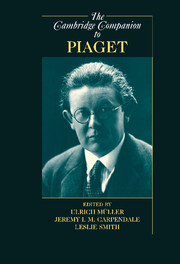Book contents
- Frontmatter
- 1 Introduction: Overview
- 2 The Historical Context Of Piaget’s Ideas
- 3 Piaget’s Developmental Epistemology
- 4 Piaget’s Biology
- 5 On the Concept(s) of the Social in Piaget
- 6 Piaget on Equilibration
- 7 Constructive Processes: Abstraction, Generalization, and Dialectics
- 8 Piaget and Method
- 9 Infancy
- 10 Childhood
- 11 Adolescence
- 12 Piaget’s Theory of Moral Development
- 13 Piaget’s Enduring Contribution to a Science of Consciousness
- 14 Piaget and Affectivity
- 15 Piaget’s Pedagogy
- 16 Piaget in the United States, 1925-1971
- 17 The Mind’s Staircase Revised
- 18 Dynamic Development: A Neo-Piagetian Approach
- Index
13 - Piaget’s Enduring Contribution to a Science of Consciousness
Published online by Cambridge University Press: 28 March 2010
- Frontmatter
- 1 Introduction: Overview
- 2 The Historical Context Of Piaget’s Ideas
- 3 Piaget’s Developmental Epistemology
- 4 Piaget’s Biology
- 5 On the Concept(s) of the Social in Piaget
- 6 Piaget on Equilibration
- 7 Constructive Processes: Abstraction, Generalization, and Dialectics
- 8 Piaget and Method
- 9 Infancy
- 10 Childhood
- 11 Adolescence
- 12 Piaget’s Theory of Moral Development
- 13 Piaget’s Enduring Contribution to a Science of Consciousness
- 14 Piaget and Affectivity
- 15 Piaget’s Pedagogy
- 16 Piaget in the United States, 1925-1971
- 17 The Mind’s Staircase Revised
- 18 Dynamic Development: A Neo-Piagetian Approach
- Index
Summary
This chapter provides an analysis of Piaget's views about consciousness and whether they deserve more sustained attention than they get in recent writings about consciousness, of which the Blackwell Companion to Consciousness (2007) and the Cambridge Handbook of Consciousness (2007) provide good examples. I will argue that they do: Although nothing said in either handbook is false - indeed, Zelazo, Gao, and Todd (2007) give a good overview of some key aspects of Piaget's thoughts about consciousness - all of these accounts are seriously impoverished versions of a much richer narrative.
In general, for many scholars writing today, what is problematic about consciousness is its “phenomenal quality” or the fact that “there is something it is like” to be conscious (Nagel, 1974). Piaget does not address this issue head-on but rather through addressing the more important problem of how subjects develop a meaningful understanding of themselves and the world. Thus, his theory addresses two fundamental epistemological concerns central to any theory of the qualities of conscious experience: (1) the subject-object relationship implicated in any type of knowing, and (2) the physical-mental relationship within the knowing subject (but not its specific mechanism).
- Type
- Chapter
- Information
- The Cambridge Companion to Piaget , pp. 287 - 308Publisher: Cambridge University PressPrint publication year: 2009
- 2
- Cited by



